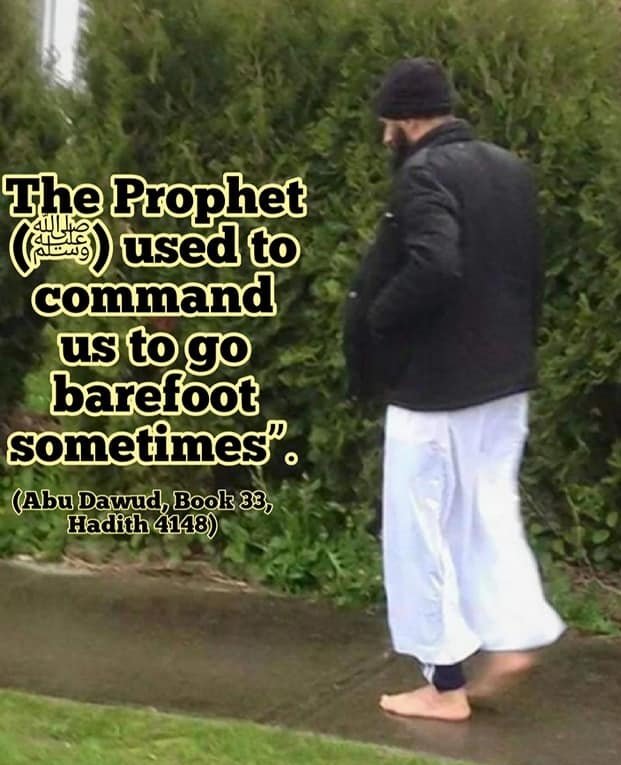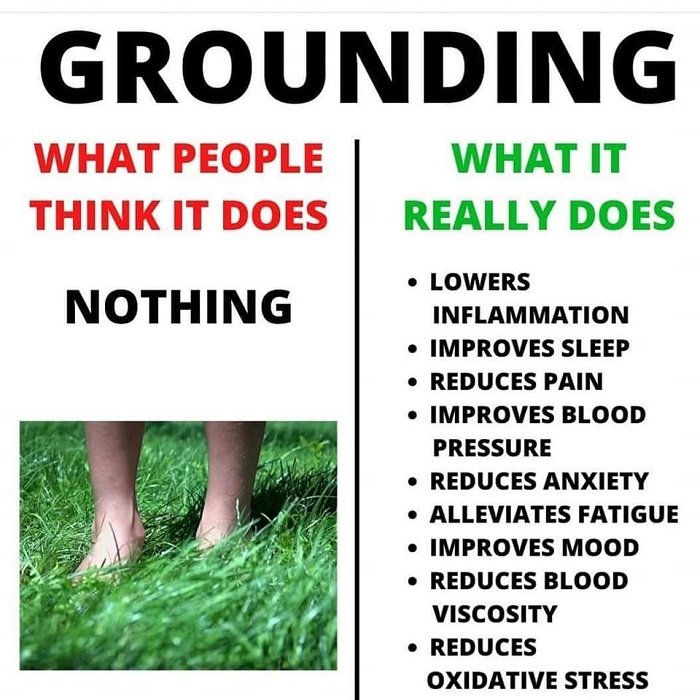𝐇𝐚𝐯𝐞 𝐲𝐨𝐮 𝐡𝐞𝐚𝐫𝐝 𝐨𝐟 𝐄𝐚𝐫𝐭𝐡𝐥𝐢𝐧𝐠 𝐨𝐫 𝐆𝐫𝐨𝐮𝐧𝐝𝐢𝐧𝐠?
Mohamad Mostafa Nassar
Twitter@NassarMohamadMR


𝐃𝐢𝐝 𝐲𝐨𝐮 𝐤𝐧𝐨𝐰: 𝐢𝐭’𝐬 𝐒𝐮𝐧𝐧𝐚𝐡 𝐭𝐨 𝐨𝐜𝐜𝐚𝐬𝐢𝐨𝐧𝐚𝐥𝐥𝐲 𝐰𝐚𝐥𝐤 𝐛𝐚𝐫𝐞𝐟𝐨𝐨𝐭?
𝐀 𝐧𝐞𝐰 𝐒𝐜𝐢𝐞𝐧𝐭𝐢𝐟𝐢𝐜 𝐌𝐢𝐫𝐚𝐜𝐥𝐞 𝐟𝐫𝐨𝐦 𝐭𝐡𝐞 𝐀𝐮𝐭𝐡𝐞𝐧𝐭𝐢𝐜 𝐓𝐫𝐚𝐝𝐢𝐭𝐢𝐨𝐧𝐬 𝐒𝐮𝐧𝐧𝐚𝐡 𝐨𝐟 𝐏𝐫𝐨𝐩𝐡𝐞𝐭 𝐌𝐮𝐡𝐚𝐦𝐦𝐞𝐝 𝐩𝐞𝐚𝐜𝐞 𝐛𝐞 𝐮𝐩𝐨𝐧 𝐡𝐢𝐦.
𝐏𝐫𝐨𝐩𝐡𝐞𝐭 𝐌𝐮𝐡𝐚𝐦𝐦𝐞𝐝 𝐩𝐞𝐚𝐜𝐞 𝐛𝐞 𝐮𝐩𝐨𝐧 𝐡𝐢𝐦 𝐮𝐬𝐞𝐝 𝐭𝐨 𝐜𝐨𝐦𝐦𝐚𝐧𝐝 𝐮𝐬 𝐭𝐨 𝐠𝐨 𝐛𝐚𝐫𝐞𝐟𝐨𝐨𝐭 𝐬𝐨𝐦𝐞𝐭𝐢𝐦𝐞𝐬.
[𝐀𝐛𝐮 𝐃𝐚𝐰𝐮𝐝, 𝐁𝐨𝐨𝐤 𝟑𝟑, 𝐇𝐚𝐝𝐢𝐭𝐡 𝟒𝟏𝟒𝟖]
𝐒𝐜𝐢𝐞𝐧𝐭𝐢𝐟𝐢𝐜𝐚𝐥𝐥𝐲 𝐒𝐩𝐞𝐚𝐤𝐢𝐧𝐠
𝐓𝐡𝐞𝐫𝐞 𝐚𝐫𝐞 𝐦𝐚𝐧𝐲 𝐧𝐨𝐧-𝐌𝐮𝐬𝐥𝐢𝐦 𝐫𝐞𝐬𝐞𝐚𝐫𝐜𝐡 𝐚𝐫𝐭𝐢𝐜𝐥𝐞𝐬 𝐭𝐡𝐚𝐭 𝐬𝐮𝐠𝐠𝐞𝐬𝐭 𝐰𝐚𝐥𝐤𝐢𝐧𝐠 𝐛𝐚𝐫𝐞𝐟𝐨𝐨𝐭 (𝐄𝐚𝐫𝐭𝐡𝐢𝐧𝐠/𝐆𝐫𝐨𝐮𝐧𝐝𝐢𝐧𝐠) 𝐢𝐬 𝐡𝐞𝐚𝐥𝐭𝐡𝐲, 𝐝𝐮𝐞 𝐭𝐨 𝐭𝐡𝐞 𝐮𝐧𝐜𝐚𝐧𝐧𝐲 𝐡𝐞𝐚𝐥𝐭𝐡 𝐛𝐞𝐧𝐞𝐟𝐢𝐭𝐬 𝐨𝐟 𝐲𝐨𝐮𝐫 𝐛𝐚𝐫𝐞 𝐟𝐞𝐞𝐭 𝐰𝐚𝐥𝐤𝐢𝐧𝐠 𝐨𝐧 𝐭𝐡𝐞 𝐩𝐮𝐫𝐞 𝐞𝐚𝐫𝐭𝐡.
𝐖𝐚𝐥𝐤𝐢𝐧𝐠 𝐁𝐚𝐫𝐞𝐟𝐨𝐨𝐭 – 𝐑𝐞𝐯𝐢𝐯𝐢𝐧𝐠 𝐚 𝐟𝐨𝐫𝐠𝐨𝐭𝐭𝐞𝐧 𝐒𝐮𝐧𝐧𝐚𝐡=𝐭𝐫𝐚𝐝𝐢𝐭𝐢𝐨𝐧 𝐨𝐟 𝐭𝐡𝐞 𝐏𝐫𝐨𝐩𝐡𝐞𝐭
“𝐆𝐨𝐢𝐧𝐠 𝐛𝐚𝐫𝐞𝐟𝐨𝐨𝐭 𝐢𝐬 𝐭𝐡𝐞 𝐠𝐞𝐧𝐭𝐥𝐞𝐬𝐭 𝐰𝐚𝐲 𝐨𝐟 𝐰𝐚𝐥𝐤𝐢𝐧𝐠 𝐚𝐧𝐝 𝐜𝐚𝐧 𝐬𝐲𝐦𝐛𝐨𝐥𝐢𝐳𝐞 𝐚 𝐰𝐚𝐲 𝐨𝐟 𝐥𝐢𝐯𝐢𝐧𝐠 – 𝐛𝐞𝐢𝐧𝐠 𝐚𝐮𝐭𝐡𝐞𝐧𝐭𝐢𝐜, 𝐯𝐮𝐥𝐧𝐞𝐫𝐚𝐛𝐥𝐞, 𝐬𝐞𝐧𝐬𝐢𝐭𝐢𝐯𝐞 𝐭𝐨 𝐨𝐮𝐫 𝐬𝐮𝐫𝐫𝐨𝐮𝐧𝐝𝐢𝐧𝐠𝐬.
𝐈𝐭’𝐬 𝐭𝐡𝐞 𝐟𝐞𝐞𝐥𝐢𝐧𝐠 𝐨𝐟 𝐞𝐧𝐣𝐨𝐲𝐢𝐧𝐠 𝐰𝐚𝐫𝐦 𝐬𝐚𝐧𝐝 𝐛𝐞𝐧𝐞𝐚𝐭𝐡 𝐨𝐮𝐫 𝐭𝐨𝐞𝐬, 𝐨𝐫 𝐜𝐚𝐫𝐞𝐟𝐮𝐥𝐥𝐲 𝐦𝐚𝐤𝐢𝐧𝐠 𝐨𝐮𝐫 𝐰𝐚𝐲 𝐨𝐯𝐞𝐫 𝐬𝐡𝐚𝐫𝐩 𝐫𝐨𝐜𝐤𝐬 𝐢𝐧 𝐭𝐡𝐞 𝐝𝐚𝐫𝐤𝐧𝐞𝐬𝐬. 𝐈𝐭’𝐬 𝐚 𝐰𝐚𝐲 𝐨𝐟 𝐥𝐢𝐯𝐢𝐧𝐠 𝐭𝐡𝐚𝐭 𝐡𝐚𝐬 𝐭𝐡𝐞 𝐥𝐢𝐠𝐡𝐭𝐞𝐬𝐭 𝐢𝐦𝐩𝐚𝐜𝐭, 𝐫𝐞𝐦𝐨𝐯𝐢𝐧𝐠 𝐭𝐡𝐞 𝐛𝐚𝐫𝐫𝐢𝐞𝐫 𝐛𝐞𝐭𝐰𝐞𝐞𝐧 𝐮𝐬 𝐚𝐧𝐝 𝐧𝐚𝐭𝐮𝐫𝐞.” – 𝐀𝐝𝐞𝐥𝐞 𝐂𝐨𝐨𝐦𝐛𝐬, “𝐁𝐚𝐫𝐞𝐟𝐨𝐨𝐭 𝐃𝐫𝐞𝐚𝐦𝐢𝐧𝐠”
𝐈𝐧 𝐭𝐡𝐞 𝐁𝐨𝐨𝐤 “𝐓𝐚𝐤𝐞 𝐨𝐟𝐟 𝐲𝐨𝐮𝐫 𝐬𝐡𝐨𝐞𝐬 𝐚𝐧𝐝 𝐰𝐚𝐥𝐤” 𝐩𝐨𝐝𝐢𝐚𝐭𝐫𝐢𝐬𝐭 𝐃𝐫. 𝐖𝐢𝐤𝐥𝐞𝐫, 𝐚𝐝𝐯𝐨𝐜𝐚𝐭𝐞𝐝 𝐠𝐨𝐢𝐧𝐠 𝐛𝐚𝐫𝐞𝐟𝐨𝐨𝐭 𝐟𝐨𝐫 𝐛𝐞𝐭𝐭𝐞𝐫 𝐟𝐨𝐨𝐭 𝐡𝐞𝐚𝐥𝐭𝐡 (𝐞𝐬𝐩𝐞𝐜𝐢𝐚𝐥𝐥𝐲 𝐟𝐨𝐫 𝐜𝐡𝐢𝐥𝐝𝐫𝐞𝐧). 𝐇𝐞 𝐚𝐥𝐬𝐨 𝐞𝐱𝐩𝐥𝐚𝐢𝐧𝐞𝐝 𝐡𝐨𝐰 𝐬𝐡𝐨𝐞𝐬 𝐨𝐟𝐭𝐞𝐧 𝐝𝐞𝐟𝐨𝐫𝐦 𝐚𝐧𝐝 𝐝𝐢𝐬𝐭𝐨𝐫𝐭 𝐨𝐮𝐫 𝐟𝐞𝐞𝐭.
𝐒𝐜𝐢𝐞𝐧𝐭𝐢𝐬𝐭𝐬 𝐭𝐨𝐝𝐚𝐲 𝐠𝐢𝐯𝐞 𝐬𝐞𝐯𝐞𝐫𝐚𝐥 𝐡𝐞𝐚𝐥𝐭𝐡 𝐛𝐞𝐧𝐞𝐟𝐢𝐭𝐬 𝐨𝐟 𝐰𝐚𝐥𝐤𝐢𝐧𝐠 𝐛𝐚𝐫𝐞𝐟𝐨𝐨𝐭, 𝐦𝐞𝐧𝐭𝐢𝐨𝐧𝐢𝐧𝐠 𝐡𝐨𝐰 𝐢𝐭 𝐜𝐚𝐧 𝐛𝐞 𝐫𝐞𝐥𝐚𝐱𝐢𝐧𝐠 𝐚𝐧𝐝 𝐡𝐞𝐥𝐩 𝐫𝐞𝐥𝐢𝐞𝐯𝐞 𝐭𝐞𝐧𝐬𝐢𝐨𝐧. 𝐒𝐨𝐦𝐞 𝐚𝐝𝐯𝐢𝐜𝐞 𝐭𝐚𝐤𝐢𝐧𝐠 𝐨𝐮𝐭 𝟑𝟎 𝐦𝐢𝐧𝐮𝐭𝐞𝐬 𝐞𝐚𝐜𝐡 𝐝𝐚𝐲 𝐭𝐨 𝐰𝐚𝐥𝐤 𝐨𝐧 𝐭𝐡𝐞 𝐟𝐥𝐨𝐨𝐫, 𝐞𝐚𝐫𝐭𝐡, 𝐠𝐫𝐚𝐬𝐬, 𝐬𝐚𝐧𝐝 𝐞𝐭𝐜.
𝐒𝐨, 𝐝𝐞𝐬𝐩𝐢𝐭𝐞 𝐚𝐥𝐥 𝐭𝐡𝐞 𝐛𝐞𝐧𝐞𝐟𝐢𝐭𝐬 𝐚𝐧𝐝 𝐩𝐥𝐮𝐬 𝐩𝐨𝐢𝐧𝐭𝐬, 𝐰𝐨𝐮𝐥𝐝𝐧’𝐭 𝐢𝐭 𝐛𝐞 𝐠𝐫𝐞𝐚𝐭 𝐭𝐨 𝐬𝐢𝐦𝐩𝐥𝐲 𝐫𝐞𝐯𝐢𝐯𝐞 𝐭𝐡𝐢𝐬 𝐛𝐞𝐚𝐮𝐭𝐢𝐟𝐮𝐥 𝐬𝐮𝐧𝐧𝐚𝐡 𝐛𝐞𝐜𝐚𝐮𝐬𝐞 𝐨𝐮𝐫 𝐛𝐞𝐥𝐨𝐯𝐞𝐝 𝐏𝐫𝐨𝐩𝐡𝐞𝐭 (𝐩𝐞𝐚𝐜𝐞 𝐛𝐞 𝐮𝐩𝐨𝐧 𝐡𝐢𝐦) 𝐜𝐨𝐦𝐦𝐚𝐧𝐝𝐞𝐝 𝐬𝐨?
𝐆𝐫𝐨𝐮𝐧𝐝𝐢𝐧𝐠:
𝐈𝐭’𝐬 𝐚 𝐜𝐨𝐧𝐭𝐚𝐜𝐭 𝐰𝐢𝐭𝐡 𝐭𝐡𝐞 𝐞𝐚𝐫𝐭𝐡’𝐬 𝐬𝐮𝐫𝐟𝐚𝐜𝐞 𝐞𝐥𝐞𝐜𝐭𝐫𝐨𝐧𝐬 𝐰𝐡𝐢𝐜𝐡 𝐭𝐫𝐚𝐧𝐬𝐟𝐨𝐫𝐦𝐬 𝐭𝐡𝐞 𝐞𝐧𝐞𝐫𝐠𝐲 𝐟𝐫𝐨𝐦 𝐭𝐡𝐞 𝐠𝐫𝐨𝐮𝐧𝐝 𝐢𝐧𝐭𝐨 𝐭𝐡𝐞 𝐛𝐨𝐝𝐲
- 𝐑𝐞𝐬𝐮𝐥𝐭𝐬 𝐚𝐫𝐞 𝐚𝐦𝐚𝐳𝐢𝐧𝐠
- 𝐑𝐞𝐝𝐮𝐜𝐢𝐧𝐠 𝐢𝐧𝐟𝐥𝐚𝐦𝐦𝐚𝐭𝐢𝐨𝐧
- 𝐃𝐢𝐚𝐛𝐞𝐭𝐞𝐬 𝐫𝐞𝐝𝐮𝐜𝐞𝐝
- 𝐌𝐢𝐧𝐢𝐦𝐢𝐬𝐢𝐧𝐠 𝐩𝐚𝐢𝐧 𝐚𝐧𝐝 𝐂𝐨𝐫𝐭𝐢𝐬𝐨𝐥 𝐥𝐞𝐯𝐞𝐥𝐬
- 𝐈𝐧𝐜𝐫𝐞𝐚𝐬𝐢𝐧𝐠 𝐬𝐥𝐞𝐞𝐩
- 𝐓𝐡𝐲𝐫𝐨𝐢𝐝𝐢𝐭𝐢𝐬 𝐜𝐚𝐬𝐞𝐬 𝐭𝐚𝐜𝐤𝐥𝐞𝐝
- 𝐒𝐭𝐫𝐞𝐬𝐬 𝐫𝐞𝐝𝐮𝐜𝐭𝐢𝐨𝐧
- 𝐂𝐨𝐫𝐭𝐢𝐬𝐨𝐥 𝐥𝐞𝐯𝐞𝐥𝐬 𝐫𝐞𝐜𝐭𝐢𝐟𝐢𝐞𝐝
𝐇𝐚𝐯𝐞 𝐲𝐨𝐮 𝐡𝐞𝐚𝐫𝐝 𝐨𝐟 𝐒𝐜𝐡𝐮𝐦𝐚𝐧𝐧 𝐫𝐞𝐬𝐨𝐧𝐚𝐧𝐜𝐞?
𝐈𝐬𝐥𝐚𝐦𝐢𝐜𝐚𝐥𝐥𝐲 𝐒𝐩𝐞𝐚𝐤𝐢𝐧𝐠
𝐀 𝐦𝐚𝐧 𝐟𝐫𝐨𝐦 𝐭𝐡𝐞 𝐜𝐨𝐦𝐩𝐚𝐧𝐢𝐨𝐧𝐬 𝐨𝐟 𝐭𝐡𝐞 𝐏𝐫𝐨𝐩𝐡𝐞𝐭 𝐩𝐞𝐚𝐜𝐞 𝐛𝐞 𝐮𝐩𝐨𝐧 𝐡𝐢𝐦 𝐭𝐫𝐚𝐯𝐞𝐥𝐞𝐝 𝐭𝐨 𝐅𝐚𝐝𝐚𝐚𝐥𝐚𝐡 𝐢𝐛𝐧 𝐔𝐛𝐚𝐲𝐝 (𝐦𝐚𝐲 𝐀𝐥𝐥𝐚𝐡 𝐛𝐞 𝐩𝐥𝐞𝐚𝐬𝐞𝐝 𝐰𝐢𝐭𝐡 𝐡𝐢𝐦) 𝐰𝐡𝐞𝐧 𝐡𝐞 𝐰𝐚𝐬 𝐢𝐧 𝐄𝐠𝐲𝐩𝐭. 𝐀𝐟𝐭𝐞𝐫 𝐚 𝐛𝐫𝐢𝐞𝐟 𝐜𝐨𝐧𝐯𝐞𝐫𝐬𝐚𝐭𝐢𝐨𝐧 𝐡𝐞 𝐚𝐬𝐤𝐞𝐝 𝐡𝐢𝐦: “𝐖𝐡𝐲 𝐝𝐨 𝐈 𝐧𝐨𝐭 𝐬𝐞𝐞 𝐚𝐧𝐲 𝐬𝐡𝐨𝐞𝐬 𝐨𝐧 𝐲𝐨𝐮?”
𝐅𝐚𝐝𝐚𝐚𝐥𝐚𝐡 𝐫𝐞𝐩𝐥𝐢𝐞𝐝: “𝐓𝐡𝐞 𝐏𝐫𝐨𝐩𝐡𝐞𝐭 𝐩𝐞𝐚𝐜𝐞 𝐛𝐞 𝐮𝐩𝐨𝐧 𝐡𝐢𝐦 𝐮𝐬𝐞𝐝 𝐭𝐨 𝐜𝐨𝐦𝐦𝐚𝐧𝐝 𝐮𝐬 𝐭𝐨 𝐠𝐨 𝐛𝐚𝐫𝐞𝐟𝐨𝐨𝐭 𝐬𝐨𝐦𝐞𝐭𝐢𝐦𝐞𝐬”.
[𝐀𝐛𝐮 𝐃𝐚𝐰𝐮𝐝, 𝐁𝐨𝐨𝐤 𝟑𝟑, 𝐇𝐚𝐝𝐢𝐭𝐡 𝟒𝟏𝟒𝟖]
𝐀𝐛𝐝𝐮𝐥𝐥𝐚𝐡 𝐢𝐛𝐧 𝐁𝐮𝐫𝐚𝐲𝐝𝐚𝐡 𝐬𝐚𝐢𝐝:
𝐀 𝐦𝐚𝐧 𝐟𝐫𝐨𝐦 𝐭𝐡𝐞 𝐜𝐨𝐦𝐩𝐚𝐧𝐢𝐨𝐧𝐬 𝐨𝐟 𝐭𝐡𝐞 𝐏𝐫𝐨𝐩𝐡𝐞𝐭 𝐩𝐞𝐚𝐜𝐞 𝐛𝐞 𝐮𝐩𝐨𝐧 𝐡𝐢𝐦 𝐭𝐫𝐚𝐯𝐞𝐥𝐥𝐞𝐝 𝐭𝐨 𝐅𝐮𝐝𝐚𝐥𝐚𝐡 𝐢𝐛𝐧 𝐔𝐛𝐚𝐲𝐝 𝐰𝐡𝐞𝐧 𝐡𝐞 𝐰𝐚𝐬 𝐢𝐧 𝐄𝐠𝐲𝐩𝐭.
𝐇𝐞 𝐜𝐚𝐦𝐞 𝐭𝐨 𝐡𝐢𝐦 𝐚𝐧𝐝 𝐬𝐚𝐢𝐝: 𝐈 𝐡𝐚𝐯𝐞 𝐧𝐨𝐭 𝐜𝐨𝐦𝐞 𝐭𝐨 𝐲𝐨𝐮 𝐭𝐨 𝐯𝐢𝐬𝐢𝐭 𝐲𝐨𝐮. 𝐁𝐮𝐭 𝐲𝐨𝐮 𝐚𝐧𝐝 𝐈 𝐡𝐞𝐚𝐫𝐝 𝐚 𝐭𝐫𝐚𝐝𝐢𝐭𝐢𝐨𝐧 𝐟𝐫𝐨𝐦 𝐭𝐡𝐞 𝐌𝐞𝐬𝐬𝐞𝐧𝐠𝐞𝐫 𝐨𝐟 𝐀𝐥𝐥𝐚𝐡 𝐩𝐞𝐚𝐜𝐞 𝐛𝐞 𝐮𝐩𝐨𝐧 𝐡𝐢𝐦. 𝐈 𝐡𝐨𝐩𝐞 𝐲𝐨𝐮 𝐦𝐚𝐲 𝐡𝐚𝐯𝐞 𝐬𝐨𝐦𝐞 𝐤𝐧𝐨𝐰𝐥𝐞𝐝𝐠𝐞 𝐨𝐟 𝐢𝐭.
𝐇𝐞 𝐚𝐬𝐤𝐞𝐝: 𝐖𝐡𝐚𝐭 𝐢𝐬 𝐢𝐭? 𝐇𝐞 𝐫𝐞𝐩𝐥𝐢𝐞𝐝: 𝐒𝐨, 𝐚𝐧𝐝 𝐬𝐨. 𝐇𝐞 𝐬𝐚𝐢𝐝: 𝐖𝐡𝐲 𝐝𝐨 𝐈 𝐬𝐞𝐞 𝐲𝐨𝐮 𝐝𝐢𝐬𝐡𝐞𝐯𝐞𝐥𝐥𝐞𝐝 𝐰𝐡𝐞𝐧 𝐲𝐨𝐮 𝐚𝐫𝐞 𝐭𝐡𝐞 𝐫𝐮𝐥𝐞𝐫 𝐨𝐟 𝐭𝐡𝐢𝐬 𝐥𝐚𝐧𝐝?
𝐇𝐞 𝐬𝐚𝐢𝐝: 𝐓𝐡𝐞 𝐌𝐞𝐬𝐬𝐞𝐧𝐠𝐞𝐫 𝐨𝐟 𝐀𝐥𝐥𝐚𝐡 𝐩𝐞𝐚𝐜𝐞 𝐛𝐞 𝐮𝐩𝐨𝐧 𝐡𝐢𝐦 𝐡𝐚𝐬 𝐟𝐨𝐫𝐛𝐢𝐝𝐝𝐞𝐧 𝐮𝐬 𝐭𝐨 𝐢𝐧𝐝𝐮𝐥𝐠𝐞 𝐦𝐮𝐜𝐡 𝐢𝐧 𝐥𝐮𝐱𝐮𝐫𝐲.
𝐇𝐞 𝐬𝐚𝐢𝐝: 𝐖𝐡𝐲 𝐝𝐨 𝐈 𝐬𝐞𝐞 𝐲𝐨𝐮 𝐮𝐧𝐬𝐡𝐨𝐝? 𝐇𝐞 𝐫𝐞𝐩𝐥𝐢𝐞𝐝: 𝐓𝐡𝐞 𝐏𝐫𝐨𝐩𝐡𝐞𝐭 𝐩𝐞𝐚𝐜𝐞 𝐛𝐞 𝐮𝐩𝐨𝐧 𝐡𝐢𝐦 𝐮𝐬𝐞𝐝 𝐭𝐨 𝐜𝐨𝐦𝐦𝐚𝐧𝐝 𝐮𝐬 𝐭𝐨 𝐠𝐨 𝐛𝐚𝐫𝐞𝐟𝐨𝐨𝐭 𝐚𝐭 𝐭𝐢𝐦𝐞𝐬.
▪︎𝐆𝐫𝐚𝐝𝐞: 𝐒𝐚𝐡𝐢𝐡 (𝐀𝐥-𝐀𝐥𝐛𝐚𝐧𝐢) صحيح (الألباني) حكم:
𝐑𝐞𝐟𝐞𝐫𝐞𝐧𝐜𝐞: 𝐒𝐮𝐧𝐚𝐧 𝐀𝐛𝐢 𝐃𝐚𝐰𝐮𝐝 𝟒𝟏𝟔𝟎
𝐈𝐧-𝐛𝐨𝐨𝐤 𝐫𝐞𝐟𝐞𝐫𝐞𝐧𝐜𝐞: 𝐁𝐨𝐨𝐤 𝟑𝟓, 𝐇𝐚𝐝𝐢𝐭𝐡 𝟐
𝐄𝐧𝐠𝐥𝐢𝐬𝐡 𝐭𝐫𝐚𝐧𝐬𝐥𝐚𝐭𝐢𝐨𝐧: 𝐁𝐨𝐨𝐤 𝟑𝟒, 𝐇𝐚𝐝𝐢𝐭𝐡 𝟒𝟏𝟒𝟖
𝐒𝐡𝐞𝐢𝐤𝐡 𝐀𝐥-𝐀𝐥𝐛𝐚𝐧𝐢 𝐬𝐚𝐢𝐝 𝐚𝐛𝐨𝐮𝐭 𝐭𝐡𝐢𝐬 𝐇𝐚𝐝𝐢𝐭𝐡 𝐢𝐧 𝐀𝐬-𝐒𝐢𝐥𝐬𝐢𝐥𝐚𝐡 𝐀𝐬-𝐒𝐚𝐡𝐞𝐞𝐡𝐚𝐡: “𝐓𝐡𝐢𝐬 𝐢𝐬 𝐚 𝐫𝐞𝐦𝐢𝐧𝐝𝐞𝐫 𝐚𝐛𝐨𝐮𝐭 𝐚𝐧 𝐮𝐧𝐤𝐧𝐨𝐰𝐧 𝐬𝐮𝐧𝐧𝐚𝐡 𝐢𝐧 𝐭𝐡𝐞 𝐦𝐢𝐧𝐝𝐬 𝐨𝐟 𝐦𝐚𝐧𝐲 𝐨𝐟 𝐭𝐡𝐞 𝐩𝐞𝐨𝐩𝐥𝐞 𝐚𝐧𝐝 𝐢𝐭 𝐢𝐬 𝐭𝐡𝐞 𝐬𝐮𝐧𝐧𝐚𝐡 𝐨𝐟 𝐰𝐚𝐥𝐤𝐢𝐧𝐠 𝐰𝐢𝐭𝐡𝐨𝐮𝐭 𝐬𝐡𝐨𝐞𝐬 𝐬𝐨𝐦𝐞𝐭𝐢𝐦𝐞𝐬. 𝐈𝐭 𝐢𝐬 𝐚 𝐬𝐮𝐧𝐧𝐚𝐡 𝐭𝐡𝐚𝐭 𝐦𝐚𝐧𝐲 𝐩𝐞𝐨𝐩𝐥𝐞 𝐚𝐫𝐞 𝐢𝐠𝐧𝐨𝐫𝐚𝐧𝐭 𝐨𝐟 𝐞𝐱𝐜𝐞𝐩𝐭 𝐚 𝐟𝐞𝐰. 𝐀𝐧𝐝 𝐢𝐟 𝐬𝐨𝐦𝐞 𝐰𝐨𝐮𝐥𝐝 𝐭𝐫𝐲 𝐚𝐧𝐝 𝐢𝐦𝐩𝐥𝐞𝐦𝐞𝐧𝐭 𝐭𝐡𝐢𝐬, 𝐭𝐡𝐞 𝐩𝐞𝐨𝐩𝐥𝐞 𝐰𝐨𝐮𝐥𝐝 𝐬𝐞𝐞 𝐭𝐡𝐢𝐬 𝐚𝐬 𝐚 𝐬𝐭𝐫𝐚𝐧𝐠𝐞 𝐚𝐟𝐟𝐚𝐢𝐫. 𝐏𝐞𝐫𝐡𝐚𝐩𝐬 𝐭𝐡𝐞𝐲 𝐰𝐨𝐮𝐥𝐝 𝐞𝐯𝐞𝐧 𝐜𝐫𝐢𝐭𝐢𝐜𝐢𝐳𝐞 𝐭𝐡𝐞𝐦 𝐟𝐨𝐫 𝐭𝐡𝐢𝐬 𝐚𝐜𝐭.”
𝐇𝐞 𝐜𝐨𝐧𝐭𝐢𝐧𝐮𝐞𝐝: “𝐒𝐨 𝐢𝐦𝐢𝐭𝐚𝐭𝐞 𝐲𝐨𝐮𝐫 𝐥𝐨𝐯𝐞𝐝 𝐨𝐧𝐞 𝐚𝐧𝐝 𝐲𝐨𝐮𝐫 𝐏𝐫𝐨𝐩𝐡𝐞𝐭 (𝐩𝐞𝐚𝐜𝐞 𝐛𝐞 𝐮𝐩𝐨𝐧 𝐡𝐢𝐦) 𝐚𝐧𝐝 𝐰𝐚𝐥𝐤 𝐛𝐚𝐫𝐞𝐟𝐨𝐨𝐭 𝐬𝐨𝐦𝐞𝐭𝐢𝐦𝐞𝐬 𝐚𝐧𝐝 𝐰𝐞𝐚𝐫𝐢𝐧𝐠 𝐬𝐡𝐨𝐞𝐬 𝐚𝐭 𝐨𝐭𝐡𝐞𝐫𝐬. 𝐀𝐬 𝐭𝐡𝐢𝐬 𝐡𝐚𝐬 𝐛𝐞𝐞𝐧 𝐚𝐮𝐭𝐡𝐞𝐧𝐭𝐢𝐜𝐚𝐭𝐞𝐝 𝐨𝐧 𝐭𝐡𝐞 𝐏𝐫𝐨𝐩𝐡𝐞𝐭 (𝐩𝐞𝐚𝐜𝐞 𝐛𝐞 𝐮𝐩𝐨𝐧 𝐡𝐢𝐦) 𝐭𝐡𝐚𝐭 𝐡𝐞 𝐰𝐚𝐥𝐤𝐞𝐝 𝐛𝐚𝐫𝐞𝐟𝐨𝐨𝐭 𝐨𝐜𝐜𝐚𝐬𝐢𝐨𝐧𝐚𝐥𝐥𝐲! 𝐄𝐱𝐜𝐞𝐩𝐭 𝐭𝐡𝐚𝐭 𝐦𝐚𝐣𝐨𝐫𝐢𝐭𝐲 𝐨𝐟 𝐭𝐡𝐞 𝐭𝐢𝐦𝐞 𝐡𝐞 (𝐩𝐞𝐚𝐜𝐞 𝐛𝐞 𝐮𝐩𝐨𝐧 𝐡𝐢𝐦) 𝐰𝐨𝐮𝐥𝐝 𝐰𝐞𝐚𝐫 𝐬𝐡𝐨𝐞𝐬.”
𝐎𝐧𝐞 𝐬𝐡𝐨𝐮𝐥𝐝 𝐠𝐨 𝐛𝐚𝐫𝐞𝐟𝐨𝐨𝐭 𝐚𝐭 𝐭𝐢𝐦𝐞𝐬 𝐚𝐧𝐝 𝐰𝐞𝐚𝐫 𝐬𝐡𝐨𝐞𝐬 𝐚𝐭 𝐨𝐭𝐡𝐞𝐫 𝐭𝐢𝐦𝐞𝐬 𝐛𝐞𝐜𝐚𝐮𝐬𝐞 𝐨𝐟 𝐰𝐡𝐚𝐭 𝐢𝐬 𝐢𝐧 𝐭𝐡𝐞 𝐡𝐚𝐝𝐢𝐭𝐡 𝐧𝐚𝐫𝐫𝐚𝐭𝐞𝐝 𝐛𝐲 𝐀𝐛𝐮 𝐃𝐚𝐰𝐮𝐝. 𝐘𝐞𝐭, 𝐢𝐟 𝐨𝐧𝐞 𝐢𝐬 𝐢𝐧 𝐚 𝐬𝐩𝐢𝐤𝐲 𝐥𝐚𝐧𝐝 𝐰𝐢𝐭𝐡 𝐭𝐡𝐢𝐬𝐭𝐥𝐞𝐬 𝐨𝐫 𝐬𝐭𝐢𝐟𝐟𝐲 𝐜𝐥𝐢𝐟𝐟𝐬 𝐭𝐡𝐞𝐧 𝐡𝐞𝐫𝐞 𝐢𝐭’𝐬 𝐛𝐞𝐭𝐭𝐞𝐫 𝐧𝐨 𝐛𝐚𝐫𝐞𝐟𝐨𝐨𝐭𝐢𝐧𝐠 𝐚𝐬 𝐲𝐨𝐮𝐫 𝐬𝐨𝐮𝐥 𝐡𝐚𝐬 𝐚 𝐫𝐢𝐠𝐡𝐭 𝐨𝐧 𝐲𝐨𝐮
(𝐄𝐱𝐩𝐥𝐚𝐧𝐚𝐭𝐢𝐨𝐧 𝐨𝐟 𝐁𝐮𝐥𝐮𝐠𝐡 𝐀𝐥 𝐌𝐚𝐫𝐚𝐦. 𝐕𝐨𝐥𝐮𝐦𝐞 𝟏𝟓 𝐏. 𝟔𝟓).
يقول الشيخ محمد بن صالح العثيمين رحمه الله
ينبغي للإنسان أن يحتفي أحياناً وينتعل أحياناً؛ لما رواه أبو داود أن النبي ﷺ كان ينهى عن كثرة الإرفاه ويأمرهم بالاحتفاء أحياناً، لكن يلاحظ الأرفق فلو كان الإنسان في أرض فيها شوك أو حجر حاد فهنا الأفضل ألا يحتفي لأن لنفسك عليك حقا.
(شرح بلوغ المرام ج 𝟏𝟓 ص 𝟔𝟓)
سلسلة تذكير المسلمين بسنن خير المرسلين
حَدَّثَنَا الْحَسَنُ بْنُ عَلِيٍّ، حَدَّثَنَا يَزِيدُ الْمَازِنِيُّ، أَخْبَرَنَا الْجُرَيْرِيُّ، عَنْ عَبْدِ اللَّهِ بْنِ بُرَيْدَةَ، أَنَّ رَجُلاً، مِنْ أَصْحَابِ النَّبِيِّ صلى الله عليه وسلم رَحَلَ إِلَى فَضَالَةَ بْنِ عُبَيْدٍ وَهُوَ بِمِصْرَ فَقَدِمَ عَلَيْهِ فَقَالَ أَمَا إِنِّي لَمْ آتِكَ زَائِرًا وَلَكِنِّي سَمِعْتُ أَنَا وَأَنْتَ حَدِيثًا مِنْ رَسُولِ اللَّهِ صلى الله عليه وسلم رَجَوْتُ أَنْ يَكُونَ عِنْدَكَ مِنْهُ عِلْمٌ . قَالَ وَمَا هُوَ قَالَ كَذَا وَكَذَا قَالَ فَمَا لِي أَرَاكَ شَعِثًا وَأَنْتَ أَمِيرُ الأَرْضِ قَالَ إِنَّ رَسُولَ اللَّهِ صلى الله عليه وسلم كَانَ يَنْهَانَا عَنْ كَثِيرٍ مِنَ الإِرْفَاهِ . قَالَ فَمَا لِي لاَ أَرَى عَلَيْكَ حِذَاءً قَالَ كَانَ النَّبِيُّ صلى الله عليه وسلم يَأْمُرُنَا أَنْ نَحْتَفِيَ أَحْيَانًا
𝐆𝐫𝐚𝐝𝐞: 𝐒𝐚𝐡𝐢𝐡 (𝐀𝐥-𝐀𝐥𝐛𝐚𝐧𝐢) صحيح (الألباني)حكم:
𝐑𝐞𝐟𝐞𝐫𝐞𝐧𝐜𝐞: 𝐒𝐮𝐧𝐚𝐧 𝐀𝐛𝐢 𝐃𝐚𝐰𝐮𝐝 𝟒𝟏𝟔𝟎
𝐈𝐧-𝐛𝐨𝐨𝐤 𝐫𝐞𝐟𝐞𝐫𝐞𝐧𝐜𝐞: 𝐁𝐨𝐨𝐤 𝟑𝟓, 𝐇𝐚𝐝𝐢𝐭𝐡 𝟐
𝐄𝐧𝐠𝐥𝐢𝐬𝐡 𝐭𝐫𝐚𝐧𝐬𝐥𝐚𝐭𝐢𝐨𝐧: 𝐁𝐨𝐨𝐤 𝟑𝟒, 𝐇𝐚𝐝𝐢𝐭𝐡 𝟒𝟏𝟒𝟖.
𝐀𝐥𝐥𝐚𝐡 𝐤𝐧𝐨𝐰𝐬 𝐁𝐞𝐬𝐭.
𝐑𝐞𝐟𝐞𝐫𝐞𝐧𝐜𝐞𝐬:
Does Walking Barefoot Have Health Benefits?
Earthing: Health Implications of Reconnecting the Human Body to the Earth’s Surface Electrons
Feel the earth beneath your feet – the benefits of Barefoot Walking (has useful embedded links)